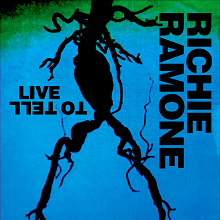By Monk
 When you emerge from the shadow of an iconic band, albeit some four decades afterwards, you are always going to be judged by your previous time served, with your subsequent efforts compared with what went before. It has happened to multiple acts, and it will happen to many more, just as it undoubtedly has happened with Richie Ramone, an artist who took his time to re-emerge into the critical public spotlight and now presents us with his third solo album.
When you emerge from the shadow of an iconic band, albeit some four decades afterwards, you are always going to be judged by your previous time served, with your subsequent efforts compared with what went before. It has happened to multiple acts, and it will happen to many more, just as it undoubtedly has happened with Richie Ramone, an artist who took his time to re-emerge into the critical public spotlight and now presents us with his third solo album.
Anyone expecting a pure and simple of Ramones’ no-nonsense punk ‘n’ roll heads down see you at the end of the song will be disappointed, as Richie once again proves there were so many additional layers to da bruvas’ sound than may have been apparent on the cursory listen which so many people give to music. There always was a deep harmony to what the Ramones did, and that is clear on the opening sonic salvos on this imperative album: the driving beat of the opening title track, the dense gothicism of ‘When The Night’ and the cheeky retrospection ‘Who Stole My Wig’ all have instantaneously recognizable riffs and melodic miens that immediately have you ‘banging your noggin in appreciation and singing the words as if you’ve known them for the past 40 years…
Not that Ramone/Reinhardt isn’t afraid to push the envelope, especially in the way in which the band did in their latter years, exploring the darker aspects of the punk mien and its seedier underbelly. His deep baritone vocal adds a substantial depth to the overall sound, espousing a more sewer-dwelling gothic noir sound than the street punk swagger which many might expect – not that the latter is missing, because it most certainly is present in every confident groove of this outstanding opus.
While it is hard to pick out highlights, a special mention has to be given to ‘Cry Little Sister’, a faithful reworking of that iconic theme from ‘The Lost Boys’: Ramone may well have been tempted to “punk it up”, but by staying as true to the original as he does, especially in terms of the haunting female vocal, he ensures that his version works.
Richie Ramone definitely has lived to tell the tale of the punk rock excesses of the early Eighties. His musical take on that era may be somewhat more subdued than it was back in those heady, hedonistic days, but he still possesses plenty of that verve and attitude, that sense of self-determination which has characterized his career and which has seen him rediscover, reinvigorate and reinvent himself.
- ‘Live To Tell‘ is released on Friday 21 April.
www.facebook.com/RichieRamoneOfficial
- All content © Über Rock. Not to be reproduced in part or in whole without the express written permission of Über Rock.
